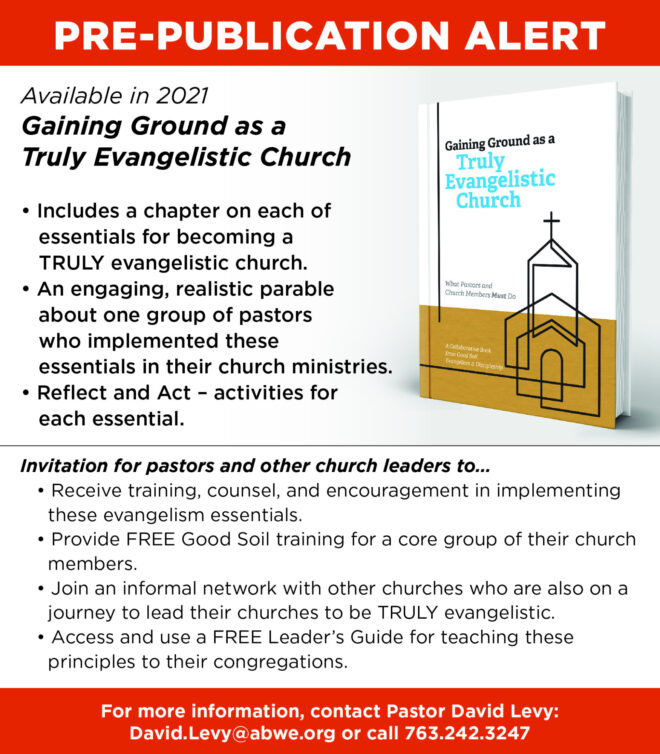Peer Accountability: "One Anothering" to Keep Believers Mission-Focused 8th Essential for a TRULY Evangelistic Church

Two-by-two, not one-by-one? It took secular business corporations, medical professionals, and educators centuries to learn a principle that Jesus taught His followers 2,000 years ago.
We all have important tasks that we (1) fear, or (2) dread, or (3) just don’t prioritize as highly as we should. Consequently, we often fail to do them. For many of us who are Christians, witnessing to people whom we know need Jesus is probably on this list. That’s why many, if not most, evangelical churches “talk the talk” of the Great Commission, but don’t “walk the walk,” at least on the local level. Good news: There is a “Game Changer” that is simple and effective.
What is the “Game Changer”? It’s the “Peer Principle.”
We’re all human, Christians or non-Christians. Often our churches can learn valuable lessons from research and organizational principles and practices found to be productive by professionals in the realms of health organizations, educational institutions, businesses, etc.
For example, medical teams have discovered that peer accountability is essential to assure that personnel are following appropriate safe practices. Businesses have learned that the most productive teams are those where “peer to peer” accountability is a part of the team culture. And there’s plenty of research to support the value of the peer principle in a wide variety of contexts where people work together.
As students of the Bible, this should come as no surprise to us. Have you noticed the frequency of “one anothers” in the New Testament? There are 59 of them! While there isn’t a “hold one another accountable to be a witness for Christ,” admonition per se, some of the “one anothers” would encompass this essential Christian responsibility, especially these:

The “one anothers” of Hebrews 10:24-25 appear in the context of assembling as a body of believers:

Fifty-nine “one anothers” in the New Testament – that’s why Andy Stanley has said:

Implementing the Evangelistic Peer Principle in Your Church
Evangelism-focused “one-anothering one another” can be a game-changer in the transformation of your church, from what it is to what you would like to see it become. Here’s what you can do to make that happen in your church:

Evangelistic Peer Partners.
Did you ever wonder why Jesus sent his disciples two-by-two on evangelistic campaigns? After all, two-by-two meant they were going to make half the number of contacts that could be made if each disciple went alone.
Think about it—why two-by-two? Based on some of my own experiences, I’m guessing it had a lot to do with mutual (peer) accountability, as well as support. It’s definitely harder to “wimp out” when you are in the yoke with someone else. So why not transfer that wisdom of Jesus into your church’s evangelistic ministry strategy?
All it takes to unleash the peer principle is two people in the church who are serious enough about the gospel that they are willing to enter into an evangelistic accountability relationship with each other. The goal: “Stirring up one another” to love sinners and do the “good work” of sharing the life-changing good news about Jesus.
One set of evangelistic peer partners can set an example that will hopefully result in another set, etc. etc.
A “Good Shepherd” pastor can spark this peer partnering by personal example—establishing the prototype partnership with another evangelism-minded man in the church. But here are some additional ideas for pastors to consider:
- Weave some of your evangelistic peer partnering experiences into sermons, where the weave is natural and most appropriate.
- Preach a series of messages on some of the key “one anothers” of the New Testament and tie some of those into the believer’s responsibility to be actively engaged in personal evangelism.
- Throw out the challenge for other members of the congregations to find an evangelistic peer partner.
Establish an official list of evangelistic peer partnerships and develop the concept into a simple and loosely structured church program, perhaps with a name more appealing than “evangelistic peer partnerships.”
Evangelistic Peer Groups.
Peer partners x two = four, plus four more a little later = eight, and on and on it grows. Peer partnerships grow into peer groups.
As committed Christians we know we have a responsibility to be witnesses for Jesus. He clearly commanded it. Furthermore, most of us feel constrained by love and compassion and conviction to see unbelievers saved, especially those we know well and love or have regular casual contacts with, such as neighbors or co-workers. All most of us need is loving admonition (a Biblical word!) to step out of our comfort zones and do what we know we should be doing. Admonition leads to action and positive action multiplies.

Evangelistic peer groups shouldn’t replace peer partnerships, but there is something dynamically contagious about being part of a group where the focus is on rescuing lost souls from eternal damnation. Here are a couple of starter ideas for evangelistic peer groups:
- Start simple, with a monthly meeting where all of the evangelistic peer partners share their recent opportunities to “initiate conversations that may lead to redemptive relationships,” “peel worldview onions,” or “bump people up the Good Soil E&D scale.” This could be done “in person” or by means of an online meeting platform.
- Create a closed (by invitation only) social media group for sharing evangelistic experiences or prayer requests.
Evangelistic Peer Congregation – the Ultimate Goal!
It’s exciting to see evangelistic accountability multiply within a congregation—a phenomenon known as “collective effervescence.” When a group comes together to communicate a common vision and participate in activities to realize that vision, collective effervescence is created which excites individuals inside the group and attracts others to join the cause.
Meditate on this encouraging statement from Patrick Lencioni’s business world “Table Group”:
“If you and your teammates can master peer-to-peer accountability with each other, you have a game-changer on your hands. Once you start to see and feel your productivity rising and the tension disappearing – you’ll be humming.”

Here’s a look back and a look forward to the entire set of articles in this “Twelve Essentials to a TRULY Evangelistic Church” series:
- Evangelistic Pastor
- E-Team
- THE Mission
- Local Focus
- Congregational Warmth
- Equipped Congregation
- Basic Discipleship
- Peer Accountability
- Evangelistic Praying
- Shared Rejoicing
- Strategic Simplicity
- Persistent Pursuit
